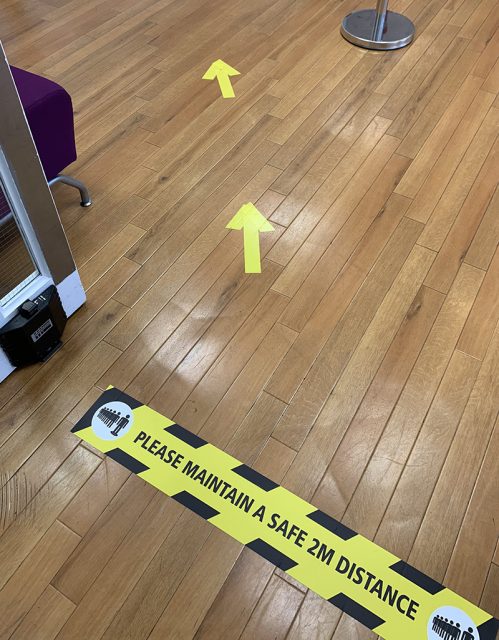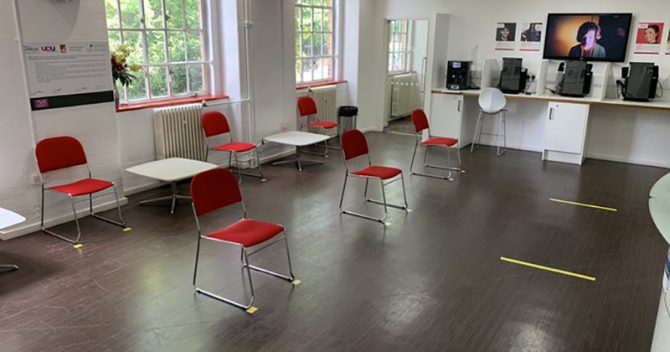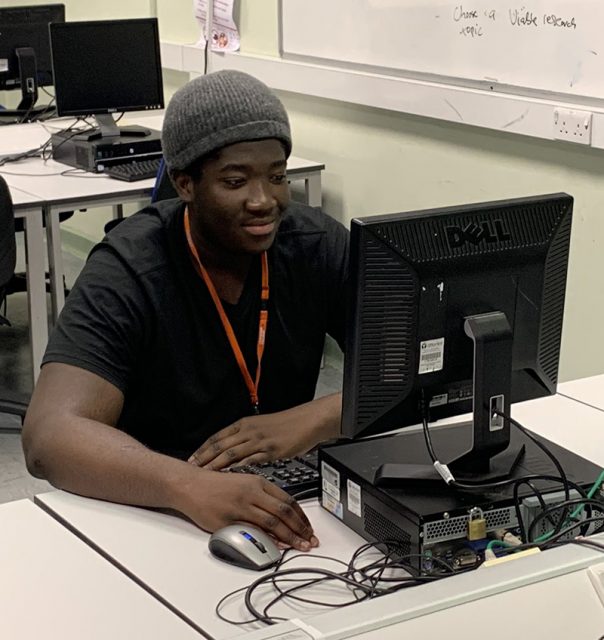On March 20 colleges closed their doors to most students as the country entered lockdown following the outbreak of Covid-19. But this month one of the biggest steps was taken to ease restrictions: the phased return of schools and other education providers. Billy Camden visits FE Week’s local college in south-east London to see first-hand how they have adapted
“Excited but nervous” was how 19-year-old Samir Ibrahim felt when he was asked by his lecturer at Lewisham College to return for face-to-face contact after 12 weeks of learning from home owing to a global pandemic.
But the first-year BTEC level 3 IT student says he was quickly put at ease as he walked through the campus doors on Tuesday and saw the lengths staff have gone to in order to keep him and his classmates safe.
Entrances are now covered with two-metre social distancing signs and arrows directing visitors through a new one-way system. Hand sanitisers are on almost every corner, plastic see-through shields protect the reception area, social spaces, including the canteen, are closed, contactless payment has been fixed on items such as vending machines, while communal water fountains have been removed.

Staff and student entrances have been separated to reduce pinch points, while learners now leave campus from a new exit that will be monitored by a security cabin which also keeps track of who is on site through contactless IDs.
And when it comes to the classroom, each one has a new capacity number based on floor space which tells students and staff how many people are allowed in at one time. Computers and work stations have been separated to the required social distance length, and wipes are provided to clean equipment before and after each use.
Lecturers are also asked to arrive early to open the door to allow students in straight away without them all having to touch the handle and to prevent queuing.
The people largely behind this transformation are the college’s head of estates, Michael Gayle, director of health and safety Wesley Mason, and facilities site manager Dean Enever.
Their team has been on site around twice a week since lockdown to carry out deep cleans and to ensure the college would be ready to reopen at any time.
After greeting me and before we tour the campus they talk me through their comprehensive 30-point risk assessment that every visitor has to read and sign before coming on site.
They are planning to create Covid-19 induction videos for life on campus come September.
Student and staff safety are of paramount importance to principal Asfa Sohail (pictured above), who has spearheaded the college through the coronavirus outbreak after joining just over a year ago from Havering College, where she was a vice principal.
But returning to campus is a “scary” and “worrying” prospect for many staff and students, a fear that was heightened after three Lewisham College staff members died in recent months after the outbreak of the virus.
“It is very tragic, and we had that as a knock-on impact on people. So we have to be very careful and cautious,” Sohail tells me, adding that 40 per cent of her staff and 82 per cent of her students respectively are black, Asian and minority ethnic (BAME) – the group of people for whom Covid-19 death rates are highest in England.
“Considering a large chunk of our staff are BAME, reopening is really a concern for us as an organisation and for our unions as well.
“The risk assessment at an individual staff and student level is a time-consuming job, but we are doing it because it’s absolutely essential.”

The college has around 6,000 learners in total, around 1,175 of whom are aged 16 to 19.
While government guidelines state that colleges can welcome back a quarter of their younger students for face-to-fact contact from June 15, Sohail says she will not go “anywhere near” that number.
The college expects fewer than 20 students each day from now until the summer break.
On the day I visit, seven are being taught in one classroom from 09.30am to midday, while a second group of seven will replace them on campus in the afternoon slot, leaving by 3.30pm to avoid using public transport in the rush hour. A small group of plumbing apprentices are also on site to complete practical assessments. Just five teachers will return for teaching this week.
“Gradually numbers will increase but we’re focusing only on those learners who need extra help or to complete their practical assessments to progress next year,” Sohail explains.
Those who are coming back are pleased with the decision to return.

Samir Ibrahim tells me: “I’m enjoying seeing my classmates again and catching up with our practical work, which is what we have all missed during lockdown.”
His peer, Jinsorp Rios Selinas, also aged 19 and on the first year of a BTEC level 3 course in IT, adds: “I was feeling worried because it is risky to come here, but the measures the college has put in place have made me feel a lot more comfortable.
“We’re doing the practical side of the course here which we can’t do at home as we do not have the software.
“It is much better to come here than being at home with online classes. It is easier to interact with our lecturer and ask questions. It is good to be back.”
As Sohail puts it: “You can never replace the human touch.”
According to the government’s English Indices of Deprivation 2019 statistics, Lewisham is the 63rd most deprived local authority in England (out of 343).
This is a challenge the college faced pre-Covid, but has been heightened this year as 40 per cent of Sohail’s students are in what she describes as “digital poverty”.
These students have not been able to engage with online lessons through the pandemic as they do not own laptops and other equipment.

While the college has been “innovative” in its attempts to overcome these barriers, by, for example, using WhatsApp and printing out copies of textbooks and mailing them to students at home, it is an issue that is of highest concern to Sohail as she looks forward to a potentially bigger reopening in September.
“There’s no way all learners can be on college campuses next year because we know social distancing will have to be maintained,” she says.
“One of the models we’re looking at is that we run the timetable as normal for 50 per cent of our learners who will come into college, and the other 50 per cent will be dialling in more.
“Now, for those 50 per cent to be dialling in remotely, they will need to have access to devices and digital connectivity, which many do not have.
“I’m asking every single forum, the Association of Colleges, our local authority, we’re knocking at the doors of businesses to say ‘if you are recycling laptops and computers, could you please donate to us so that we can reconfigure and give to our students?’
“That is my biggest worry for next term.”
The wider cost of reopening, including paying for signage, cleaning materials and implementing social distancing measures, was described by head of estates Michael Gayle as “astronomical”.
To date the college has spent £8,500 on hand sanitiser stations and two different types of gel refill stocks (one with alcohol and one without), £9,500 on signage, £4,500 on protective screens, £900 on the external security booth hired to manage the campus one-way exit system, and £4,800 on PPE.
These costs, particularly for security, additional cleaning staff and consumables, will only increase come September.
And all of this unforeseen expenditure must come from the college’s existing budget, as the Department for Education has said it will not provide any financial help in this area.
Sohail said if the college had still been a standalone (in August 2017 it joined NCG, one of the biggest college group’s in the country) it would have found it “really difficult” to survive, because of Covid’s “significant” costs.
Looking ahead to September, Lewisham College is planning for every possibility but hopes to be in a position to reopen its social spaces, including the canteen (with all of the required social distancing measures in place), as well as the hair and beauty facilities – provision which requires students to be in close contact.
But one thing is for sure, according to Sohail, campus will be a “very different place”.









Your thoughts